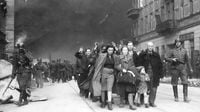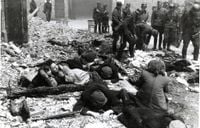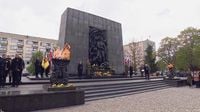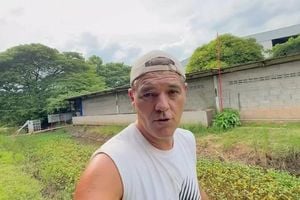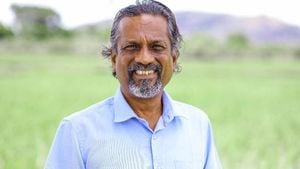On April 19, 1943, the Warsaw Ghetto Uprising erupted, marking a pivotal moment in history as the largest armed revolt by Jews during World War II. This uprising, set against the backdrop of the Holocaust, was not only a desperate act of resistance but also a profound assertion of dignity and humanity in the face of brutal oppression.
The Warsaw Ghetto was established by the Germans and became the largest ghetto in occupied Europe. As of October 1939, approximately 360,000 Jews resided in Warsaw. Following Heinrich Himmler's orders on October 30, 1939, which mandated the relocation of Polish and Jewish populations to the General Government, the Jewish population in Warsaw swelled by around 90,000 between November 1939 and October 1940. Despite the dire conditions, the ghetto's population peaked at about 460,000 by early 1941.
However, the situation deteriorated rapidly. On July 22, 1942, the Germans commenced a systematic deportation of Jews from the ghetto, initially housing around 380,000 individuals. Within two months, approximately 250,000 to 300,000 Jews were sent to the extermination camp in Treblinka and murdered. This grim reality galvanized the remaining residents, leading to the establishment of the Jewish Combat Organization (ŻOB) in late July 1942, which coordinated resistance efforts.
By the time the uprising began, the ŻOB had about 600 members, many of whom were poorly armed. The uprising started early in the morning on April 19, 1943, when 850 Waffen-SS soldiers entered the ghetto, armed with machine guns, flamethrowers, and armored vehicles. They were met with fierce resistance from the Jewish fighters. In the initial skirmish, the insurgents managed to repel the German forces, but this success was short-lived.
Later that day, better-armed German troops, commanded by SS General Jurgen Stroop, returned in greater numbers, with over 2,000 soldiers, including auxiliary units from Ukraine, Lithuania, and Latvia. The Jews, numbering around 1,000 poorly armed fighters, engaged in a desperate battle. For nearly a month, the insurgents resisted the German onslaught, with the fiercest fighting occurring around Zamenhoffa and Nalewki Streets, as well as Muranowski Square.
Despite their bravery, the ghetto was systematically razed. The Germans employed a strategy of burning down buildings to flush out the remaining civilians and fighters hiding in bunkers. An appeal from ŻOB to the Polish underground for assistance yielded little support, as the Polish resistance was hesitant to provide weapons, fearing they might need them for their own struggles against the Nazis.
On May 8, the Germans discovered a large bunker at 18 Miła Street, where several hundred people, including ŻOB leaders and fighters, were hiding. Most of the insurgents, including their commander Mordechai Anielewicz, chose to commit suicide rather than surrender. This tragic end highlighted the desperation and resolve of those involved in the uprising.
In protest against the indifference of the international community to the plight of the Jewish people, Szmul Zygielbojm, a member of the National Council in London, took his own life on May 12, 1943. In his farewell letter, he lamented the world's passive observation of the genocide, stating, "The responsibility for the crimes against the entire Jewish population in Poland falls primarily on the murderers, but it also indirectly burdens all of humanity, the nations, and the governments of the Allied states, which have not yet attempted to take concrete action to stop this crime."
The uprising continued until May 16, 1943, when General Stroop declared the end of the pacification operation and ordered the destruction of the Great Synagogue on Tłomackie Street, symbolizing the total annihilation of the Jewish presence in Warsaw.
In the aftermath, reports indicated that over 56,000 Jews were discovered in bunkers, with approximately 6,000 dying in combat, fires, or poisoning. Another 7,000 were murdered, while an equal number were sent to Treblinka. The remaining 36,000 were deported to other camps, primarily Auschwitz and Majdanek. German reports claimed only a dozen soldiers were killed, but Jewish and Polish sources suggest the actual numbers were significantly higher.
Today, as we commemorate the 82nd anniversary of the Warsaw Ghetto Uprising, ceremonies in Warsaw will begin at noon with the sound of sirens, honoring the memory of those who fought for freedom and dignity. Mariusz Frankowski, the Mazovian Voivode, emphasized the importance of this day, stating, "We will pay tribute to the heroes who stood up to an unequal fight against the enemy and paid the highest price for it."
The main ceremony will take place at the Warsaw Ghetto Heroes Monument and will include representatives from the Jewish community, veterans, Righteous Among the Nations, government officials, diplomats, and residents of the capital. A March of Remembrance will follow, tracing significant memorial sites associated with the ghetto, including the Żegota Monument and the Anielewicz bunker, culminating at Umschlagplatz on Stawki Street.
Artur Hofman, president of the Social and Cultural Society of Jews in Poland, reflected on the significance of the uprising, noting that it serves as an inspiration for contemporary Jews to remember the heroes of the Jewish Combat Organization and the Jewish Military Union. He urged that the anniversary should not only remind us of a tragic chapter in history but also act as a catalyst for dialogue, understanding, and reconciliation.
The Warsaw Ghetto Uprising remains a powerful symbol of resistance against tyranny. It ignited a spirit of defiance that resonated beyond its immediate context, sparking similar uprisings in other ghettos, albeit on a smaller scale. The bravery of those who fought in the ghetto serves as a reminder of the enduring struggle for dignity and human rights.
As we reflect on these events, we honor the memory of those who fought and fell, recognizing their courage in the face of overwhelming odds. The legacy of the Warsaw Ghetto Uprising continues to inspire movements for justice and equality across the globe.
